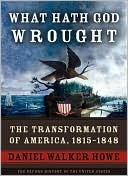Even though the treaty represented the work of a man who defied him, it embodied the objectives for which Polk had gone to war. Polk had successfully discovered the latent constitutional powers of the commander in chief to provoke a war, secure congressional support for it, shape the strategy for fighting it, appoint generals, and define the terms of peace. He probably did as much as anyone to expand the powers of the presidency—certainly at least as much as Jackson, who is more remembered for doing it. The contrast with Madison’s conduct of the War of 1812 could not be sharper. Wartime
...more
Welcome back. Just a moment while we sign you in to your Goodreads account.


